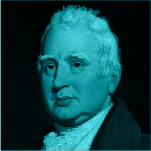William Cobbett was born on 9 March 1763 in Farnham, England. His father, a farmer and publican, gave him a basic education. In May 1783 Cobbett impulsively travelled to London where he worked as a clerk in Gray’s Inn. Cobbett joined the 54
th (West Norfolk) Regiment of Foot in 1783 and saw service in Canada. He educated himself in his spare time. He worked his way through the ranks to become Sergeant Major, the most senior rank for a non-commissioned officer. He returned to England with his regiment and obtained his discharge in 1791. The following year, he married Anne Reid whom he had met whilst posted at Fort Howe in Saint John, Fredericton, New Brunswick.
Cobbett disliked military corruption and wrote
The Soldier’s Friend (1792) which protested against the low pay and harsh treatment of men enlisted. His writing caused a stir and, sensing he was in trouble, Cobbett fled to France in March 1792. Upon arrival, Cobbett found France in the midst of the French Revolution. He sailed to America where he became a controversial, political writer under the pseudonym, Peter Porcupine. He.
He returned to England in 1800 where started a newspaper,
The Porcupine, but had limited success. He then began
The Political Register. The weekly paper was initially anti-Jacobin, but by 1804, Cobbett had begun to question the government’s policies, especially its debt and extravagant use of sinecures. Between 1804 and 1812, Cobbett published the
Complete Collection of State Trials which collated accounts of parliamentary debates since 1066, he later sold his interests to T.C Hansard. He planned to stand for Parliament in 1806, but was persuaded by Thomas Cochrane 10
th Earl of Dundonald, the naval hero, to let him stand instead. Their campaign was unsuccessful as they refused to buy votes. This situation encouraged Cobbett to push for parliamentary reform.
In June 1810, after writing in
The Political Register, that he objected to the flogging of militiamen in Ely by the Hanoverians, Cobbett was sentenced to two years in Newgate Prison. Whilst inside, Cobbett wrote
Paper against Gold, which discussed the danger of paper money, as well as other essays and letters. On his release, a huge dinner was held in his honour.
The newspaper tax in 1815 meant that Cobbett sold only a thousand copies of
The Political Registrar a week. In 1816, he chose to publish it as a cheap pamphlet. He soon had a circulation of forty thousand.
The Political Registrar became the main newspaper read by the working class, making Cobbett a dangerous man. In 1817 he learned that he was to be arrested for sedition and fled to America. For two years he lived on a farm at Long Island where he wrote
Grammar of English Language (1818) and
American Gardener (1821), one of the earliest horticultural books in America.
Cobbett returned to England in 1819, shortly after the Peterloo Massacre. He was charged with libel three times over the next two years. He also stood for Parliament three times, Coventry (1820), Preston (1826), Manchester (1829), but was unsuccessful. He finally succeeded after the 1832 Reform Act and won a seat at Oldham which he used to attack government corruption and the 1834 Poor Law.
In 1820, he established a plant nursery where he grew different strains of maize named ‘Cobbet’s Corn’ which he advertised in
A Treatise on Cobbett’s Corn (1828). He also wrote
Cottage Economy (1822) which taught the cottager how to be self-sufficient. Cobbett was fascinated by the plight of the rural poor and rode around the country making observations. His most famous work,
Rural Rides, was published as a serial in
The Political Registrar between 1822 and 1826 before being published as a book in 1830. Cobbett continued to publish controversial material in his newspaper and in 1831 he was charged with seditious libel after writing a pamphlet entitled
Rural War. Cobbett took on his own defence and was so successful that the jury found him not guilty.
From 1831 until his death he lived on a farm at Normandy, Surrey. He died there after a short illness on 18 June 1835 and was buried at St Andrews Parish Church, Farnham.


